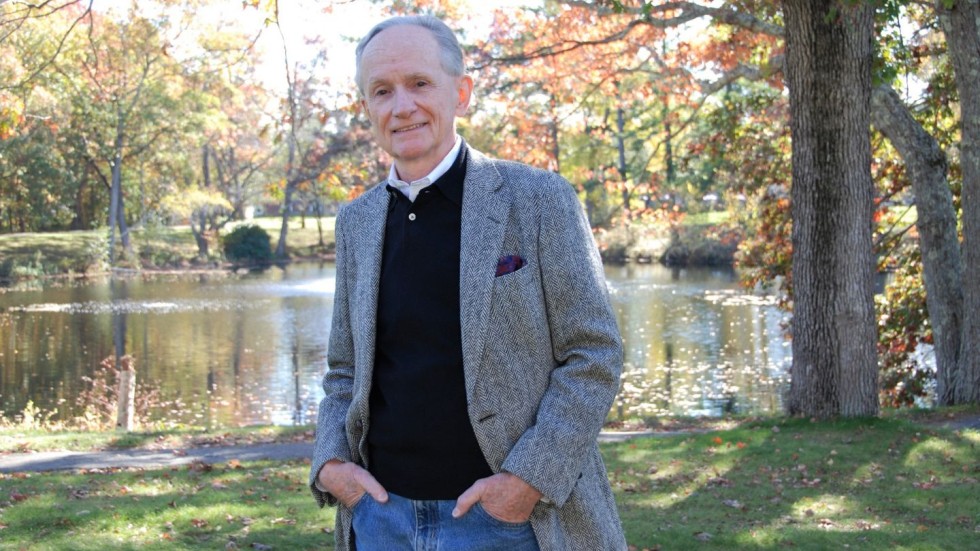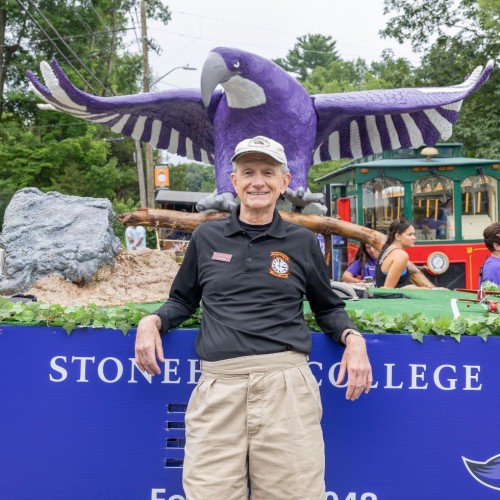
Ken Michel ’68
Five Questions with Ken Michel ’68
Ken Michel shares how Stonehill shaped his life—and why he’s stayed connected since 1968.
When Ken Michel ’68 was nearing graduation from Oliver Ames High School in 1964, college wasn’t in his plans—but he had caught the attention of Fr. William Gartland, C.S.C. As Stonehill’s beloved “Ambassador of Goodwill” and director of the College’s athletics program, Fr. Gartland was a regular at Ken's high school basketball practices and saw something in him: a strong work ethic and the kind of drive that couldn’t be reflected on a report card.
Fr. Gartland believed that Ken could thrive on the Hill, and he made sure he believed it, too. Stonehill ended up being the only college he visited and applied to. In many ways, because of Fr. Gartland’s intervention, it felt less like he chose Stonehill and more like Stonehill chose him.
Ken majored in accounting, then went on to earn his law degree from Suffolk University, becoming a tax specialist. After years in the tax advantaged real estate field, he decided to strike out on his own, founding Michel Associates, Ltd.—a Boston-based firm that has successfully sponsored a series of affordable housing and Tax Credit investment partnerships for high-net-worth individuals, financial institutions and corporations. But he hadn’t seen the last of Fr. Gartland.
In five questions, Michel reflects on the impact of his work, his enduring connection to Stonehill and the deep sense of purpose that continues to guide his service to both the College and the town of Easton.
You’ve stayed deeply connected to Stonehill for decades—as a Class Agent, two-time Chair of the Stonehill College Fund, Board of Fellows Chairman and a dedicated supporter of Men’s and Women’s basketball. What has motivated your long-term involvement with Stonehill?
I was on a train heading into Boston about three years after I graduated. I was working at an accounting firm at the time. Suddenly, I heard someone call my name: "Ken!" I looked over, and there was Fr. Gartland. He said, "Your class needs a Class Agent." I thought he was going to ask if I knew someone who might be interested, but instead, he said, "You’re it." So, I said "Yes, Father!" After all, he got me into Stonehill in the first place. I was just following the orders of the man who changed everything for me. My continued involvement has always stemmed from simply wanting to give back.
You’ve built a remarkable career in real estate and financial services as founder of Michel Associates, Ltd. What impact are you most proud of?
Helping to finance the creation of about 20,000 units of affordable housing across the country over the course of my career. From my perspective, I’ve been able to make a living doing something I enjoy, while contributing to something that benefits others. In other words, although it’s a bit of a cliché, I’ve done well by doing something good.
In addition to your work and Stonehill involvement, you’re president of the Easton Historical Society and Museum, a member of the Easton 300th Anniversary Committee and Treasurer of the Easton Legacy Fund. What inspires your commitment to local history and community life?
I’ve lived in Easton on and off since 1960, when my family moved here from Boston. Through my involvement in various community, charitable and sports activities, I've come to love Easton, and it is home to Stonehill.
As a member of the 300th Anniversary Committee, I consider myself a utility player—helping to raise funds and assisting in whatever else needs doing. The Easton Historical Society and Museum organized a trolley for the Easton 300 Parade, part of the town’s Tricentennial celebration. With 34 people aboard, including members of the 1952 Lions, one of the town’s first four Little League baseball teams, we rode just behind Stonehill’s float. It was a great way to celebrate Easton’s rich history.
Through the Historical Society, I’ve also helped organize 300th anniversary events such as a symposium on the architect H.H. Richardson with Oakes Ames Memorial Hall and the Ames Family in April. We also screened the restored 1916 silent film of Snow White at the Hemingway Theatre in partnership with the Ames Free Library and Stonehill in May, charging just 15 cents per person, the original 1916 admission price. With an audience of about 200, we cleared $30!
I think many of my peers—both before and after me—felt a similar gratitude. Stonehill gave us opportunity, support and a sense of community that remains unchanged, even decades later.
During your time leading the Stonehill College Fund, you emphasized that every gift matters. Why was that message important to you then, and why do you think it still resonates today?
It was about raising money for the College, but more importantly, it was about the message behind it. When I said, "Every gift matters," it was to help people understand a simple fact: if someone can only give $5, they might think it doesn’t count, especially when others are giving $5,000 or even $5 million. But the truth is, every gift is part of the whole. Whether you give $5 or $5 million, your gift matters. It’s the collective participation that makes the difference.
What advice would you give current Stonehill students and recent graduates about staying involved with the College in ways that are meaningful to them?
They have to have the motivation—a reason—to give back.
When I was a junior, my father was very ill and could not work. He was the sole support for our family—my parents and my five siblings. I was working to pay my way through Stonehill, but I had to help at home. I was facing a hard choice: stay in school and figure out how to pay tuition or leave and help support my family.
I spoke to Fr. Jack McCarthy, C.S.C., our class chaplain, about my problem and told him I would have to leave school. He helped to find a way for me to stay. Fr. McCarthy's help made all the difference. It meant staying at Stonehill and finishing my education.
I think many of my peers—both before and after me—feel a similar sense of gratitude. Stonehill gave us opportunity, support and a sense of community that remains unchanged, even decades later.
I’ve always felt a responsibility to give back to the school because of what it gave me. So, I’d say this: if Stonehill has worked for you—if it gave you something meaningful—stay connected. Because in giving back, you’ll find that you benefit just as much as the College.

